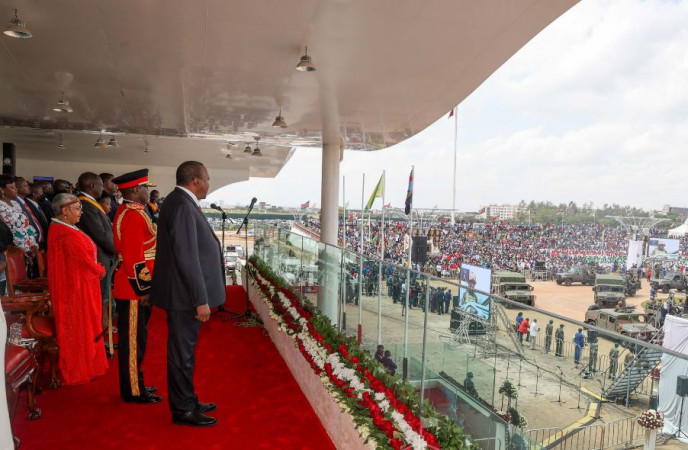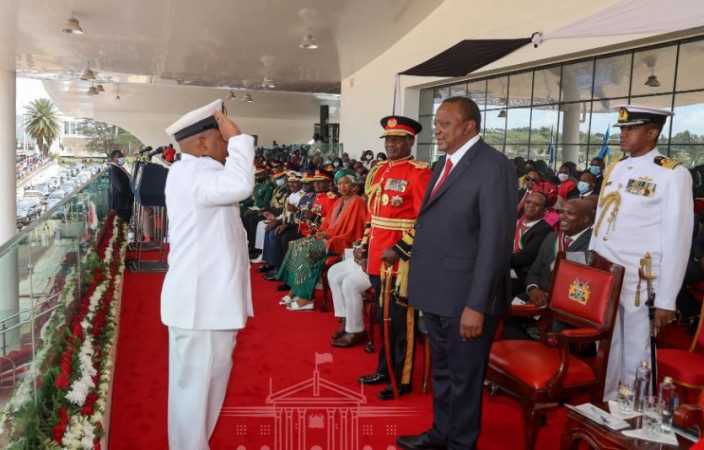Uhuru’s 9-year scorecard
By Francis Muli, June 1, 2022President Uhuru Kenyatta has highlighted infrastructural development as one of his biggest achievements during his nine-year tenure in office.
Speaking during the 59th Madaraka Day Celebrations, Uhuru revealed that his administration has built over 11,000 kilometres of road. He said that 3,000 kilometres of roads were built in the first term between 2013 and 2017, while 8,000 kilometres were built in the second term between 2017 and 2022.
“I am proud to record that, if the Third Administration built 2,000 Kms of tarmac roads, we accelerated his achievement by building over 11,000 Kms, which is close to six times what they built. In fact, we have built more roads in 9 years than what the previous administrations combined, including the colonizers, built in 123 years,” Uhuru said.
“Our world-class infrastructure, from iconic elevated expressways to floating bridges, have put Kenya on the global map. As a result, we have distinguished ourselves as an investment destination of choice, a regional and continental hub, and a leader on the African continent.”
As a result, Uhuru said that in the last nine years, Kenya has moved from being the 12th largest economy in Africa, to being the sixth-largest economy in the continent. The President said that Kenya almost tripled its wealth from a GDP of Ksh4.5 trillion in 2013, to close to Ksh13 trillion currently.
He said during the nine years, Kenya’s power generation has grown 40 times and the government connected more homes to electricity than any other country in Africa.
Water and irrigation
According to the President, the government has made tenfold investments in the water sector so as to accord every Kenyan household the dignity of access to water and sanitation.
“We did this by building dams (including Thiba Dam in Kirinyaga, Yamo Dam in Samburu County) and we are on course to complete and to start others, notably: Thwake Dam (Kitui/Machakos/Makueni), Mwache Dam (Coast Region), Karimenu Dam (Kiambu), Siyoi Muruny (West Pokot), Bute Dam (Wajir), and Soin Koru Dam (Nyanza),”he said.
“In total, we are currently implementing 685 water and sanitation projects across the country, so that by the end of this year at least 80 percent of Kenyan households will have access to water and 40 percent access to sanitation.”

At least 13 Million Kenyans are connected to clean water currently. On irrigation, President Uhuru Kenyatta said that the government has managed to recover and to double the total acreage of land under irrigation from 374,000 acres in 2013 to 664,000 acres in 2022.
Health
The country has registered a 400 percent growth in the number of Kenyans insured under National Hospital Insurance Fund (NHIF)with at least 17.1 million Kenyans insured compared to 4.4 Million insured as at April 2013.
The government has also constructed an additional 1,912 healthcare facilities across all levels of care countrywide; representing a 43 percent increase in the total number of public health facilities in the country.
“These facilities range from the recently commissioned modern state-of-the-art Level 6 Kenyatta University Teaching, Referral and Research Hospital to health centers and dispensaries at the village level,” he added.
The ICU capacity has grown by 502 percent, from 108 to 651 ICU-ready beds. Similarly, the total hospital bed capacity as a country has also increased by 47 percent from 56,069 in 2013 to 82,291 hospital beds.
Through NMS, Uhuru’s government built 29 new hospitals in the informal settlements in 100 days.
“In fact, we just opened a level five hospital in the settlements, popularly known as “Korogocho”,” said Uhuru.
The government has also built 54 renal units located in the 47 counties and installed 360 state-of-the-art dialysis machines.
Environment
President Kenyatta said that the government has been able to plant 1.34 billion trees in the last nine years, moving Kenya’s forest cover from 6.99 percent in 2013 to 8.83 percent in 2022, and the tree cover to 12.3 percent, well over the 10 percent envisaged in the constitution and eight years ahead of the target date of the year 2030.
To halt the destruction of water towers, he said that the government has contained the encroachment and illegal extraction activities in the water towers resources in the Maasai Mau Forest Complex.
“We also banned single-use polythene bags, and in doing so saved marine and terrestrial life from that deadly hazard, while also setting the stage for the beautification of our urban areas that had been choking under mounds of polythene waste. This initiative has led to the emergence of our nation as a leader in climate change action and established a thriving green economy fueled by green innovations,” he said.
Security
President Uhuru Kenyatta also took pride in the improvement of the security sector, saying that the security forces have silenced the wave of terror attacks that had a stranglehold on Kenya.
“We achieved this by retooling our security organs and making them more capable to address the dynamic contemporary security challenges that Kenya faces,” he said.
Education
Despite getting criticism from certain quotas, Uhuru praised the Competency-Based Curriculum introduced by his government, terming it as a game changer.
“(This is) a system that brings about freedom to be creative and innovative as individuals. This is the promise of the Competency-Based Curriculum and that is why in December 2022, the pioneer CBC Class, now in its sixth grade, will transition to Junior Secondary. Given the manifest successes achieved in this short period of time, there is no turning back with respect to the Competency-Based Curriculum,” he said.
He added that the government has secured 100 percent transition from Primary to Secondary education, ensuring that no-child is left behind, achieved Africa’s first 1:1 child to book ratio and restored the integrity of national examinations.
“In regard to higher education, we live in a time when knowledge is replacing other resources as the main driver of economic growth; and thus, education has increasingly become the foundation for greater individual prosperity,” he added.
“Our universities continue to incubate innovations and prepare the next generation of leaders who are technically proficient and knowledgeable. Talents continue to be nurtured and a workforce that is globally competitive is with each passing year, transitioning from our institutions of higher learning into prominent positions locally and abroad.”
He said that there stood only 52 institutions in 2013 but the number has risen to 238 institutes, representing a 435 percent growth.
